Eerdmans Pauline Studies Collection (15 vols.)
Digital Logos Edition
Overview
The Apostle Paul is one of Christianity’s most important figures. From the famous story of his conversion, to the stories of his missionary journeys, to his house arrest in Rome, the life of Paul, the letters he wrote, and the theology he articulated profoundly influenced the early history of Christianity, as well as the trajectory of Christian theology through the centuries. Writing a large portion of the New Testament and perhaps the most outspoken proponent of Christian theology in the early Church, Paul continues to exert a powerful influence in the lives of Christians today. The Eerdmans Pauline Studies Collection gathers a diverse set of scholarly voices addressing a wide range of issues surrounding Paul and his writings.
Get more books at a bigger discount when you order the Eerdmans Bible Reference Bundle!
This title is included in the following collections
You can save when you purchase this product as part of a collection.
Logos 8 Collector's Edition Le...
$11,399.99$11,399.99Logos 7 Collector's Edition Le...
$11,399.99$11,399.99Logos 8 Ultimate Legacy Librar...
$21,749.99$21,749.99Eerdmans Ultimate Collection (...
$37,403.33$27,999.99

- Analyzes the Pauline Epistles in their literary, ancient, and modern contexts
- Addresses current debates surrounding Pauline theology
- Includes the diverse perspectives of numerous biblical scholars and theologians
- Title: Eerdmans Pauline Studies Collection
- Publisher: Eerdmans
- Volumes: 15
- Pages: 5,398
- Paul: Missionary of Jesus by Paul Barnett
- The Deliverance of God: An Apocalyptic Rereading of Justification in Paul by Douglas A. Campbell
- Apostle of the Crucified Lord: A Theological Introduction to Paul and His Letters by Michael J. Gorman
- Called to Lead: Paul’s Letters to Timothy for a New Day by Anthony B. Robinson and Robert W. Wall
- Where Is Boasting?: Early Jewish Soteriology and Paul’s Response in Romans 1–5 by Simon J. Gathercole
- Unlocking Romans: Resurrection and the Justification of God by J. R. Daniel Kirk
- Cruciformity: Paul’s Narrative Spirituality of the Cross by Michael J. Gorman
- The Conversion of the Imagination: Paul as Interpreter of Israel’s Scripture by Richard B. Hays
- Anti-Judaism in Galatians?: Exegetical Studies on a Polemical Letter and on Paul’s Theology by Michael Bachmann
- The Church’s Guide for Reading Paul: The Canonical Shaping of the Pauline Corpus by Brevard S. Childs
- Recovering Paul’s Mother Tongue: Language and Theology in Galatians by Susan Eastman
- Jesus and Paul Reconnected: Fresh Pathways into an Old Debate edited by Todd D. Still
- Justification Reconsidered: Rethinking a Pauline Theme by Stephen Westerholm
- All Things to All Cultures: Paul Among the Jews, Greeks and Romans edited by Mark Harding and Alanna Nobbs
- God’s Saving Grace: A Pauline Theology by Frank J. Matera
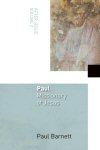
Was Paul the “second founder” of Christianity, striking off in directions Jesus never envisaged and teaching lessons Christ never endorsed? In this study Paul Barnett sets out to establish that, current theories aside, Paul was a true missionary of Jesus, authentically extending the Lord’s mission. Arguing that Paul’s own writings are uniquely supplemented by Luke’s contemporaneously written narrative of the Acts of the Apostles, Barnett follows Paul on a decade of travels, examining him in his historical context and as revealed by his writings. Including maps of Paul’s travels and five helpful appendixes, this volume is ideal for anyone interested in seeking out the historical truth of Christianity.
A well-written, concise introduction to Paul’s activities as a missionary based on his letters and Luke’s Acts of the Apostles. The book is full of valuable scholarly information and takes a special look at discussed Pauline problems.
—Martin Hengel, professor emeritus of new Testament and Early Judaism, University of Tübingen
This wonderful book will certainly become auxiliary reading in the courses I teach on Acts and Paul. It puts together Acts and Paul’s own writings in a fashion that is believable, attentive to the texts themselves, and full of life and vitality. Above all, Paul is simultaneously grounded in history and shown to be utterly captured by Christ and his gospel. Insights into the biblical material leap from many pages. I hope this volume will circulate widely.
—D. A. Carson, research professor, Trinity Evangelical Divinity School
Paul Barnett is visiting fellow in ancient history at Macquarie University, Sydney, Australia, and teaching fellow in biblical studies at Regent College, Vancouver, British Columbia.
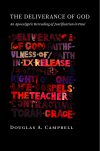
This book breaks a significant impasse in much Pauline interpretation today, pushing beyond both Lutheran and “New” perspectives on Paul to a noncontractual, “apocalyptic” reading of many of the apostle’s most famous—and most troublesome—texts. In The Deliverance of God, Douglas Campbell holds that the intrusion of an alien, essentially modern, and theologically unhealthy theoretical construct into the interpretation of Paul has produced an individualistic and contractual construct that shares more with modern political traditions than with either orthodox theology or Paul’s first-century world. In order to counter-act that influence, Campbell argues that it needs to be isolated and brought to the foreground before the interpretation of Paul’s texts begins. When that is done, readings free from this intrusive paradigm become possible and surprising new interpretations unfold.
Douglas A. Campbell is associate professor of New Testament at Duke Divinity School. He is the author of The Quest for Paul’s Gospel: A Suggested Strategy.
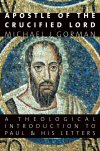
Unlike the many books that treat the Apostle Paul merely as a historical figure and his letters as literary relics, this new study by Michael Gorman focuses on the theological message of Paul’s writings, particularly what they have to say to the contemporary church. An innovative and comprehensive treatment of Paul, including commentary on all of the Pauline letters, Gorman’s Apostle of the Crucified Lord unpacks the many dimensions of Paul’s thought carefully and holistically. Six introductory chapters provide background discussion on Paul’s world, his resume, his letters, his gospel, his spirituality, and his theology, while the main body of the book covers each of the Pauline epistles. Gorman gives the context of each letter, offers a careful reading of the text, and colors his words with insightful quotations from earlier interpreters of Paul.
This book is written in a very accessible style to students of different levels, and at the same time it is a deep exploration of what lies at the heart of Paul’s theological vision. Michael Gorman provides a sure and steady guide to Paul, contextualizing his life, letters, and theology every step of the way. Gorman’s ability to emphasize the stories of the churches underlying Paul’s letters—the story within each letter—is a particularly welcome feature of the book. This is the best textbook on Paul I have found.
—Jeffrey S. Siker, chair of the department of theological studies, Loyola Marymount University
This fine book is accessible and informed, insightful and engaging. With well-chosen emphases, Michael Gorman provides a comprehensive, clearly arranged discussion of Paul as apostle, pastoral theologian, and writer of very important letters.
—Warren Carter, professor, Brite Divinity School
Michael J. Gorman holds the Raymond E. Brown Chair in Biblical Studies and Theology at St. Mary’s Seminary and University, Baltimore, Maryland. A highly regarded New Testament scholar, he is the author of Reading Revelation Responsibly: Uncivil Worship and Witness and Elements of Biblical Exegesis: A Basic Guide for Students and Ministers.
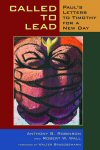
In this volume, pastoral leader Anthony Robinson and biblical scholar Robert Wall expound on Paul’s two pastoral letters to Timothy, which contain crucial messages for churches today. Featuring both careful exegetical study and dynamic contemporary exposition, Called to Lead interprets the text of 1 and 2 Timothy as Scripture and applies it to today’s church—without shying away from vexing issues such as the church’s use of money, leadership succession, pastoral authority, and the role of Scripture.
For a very long time the pastor-to-pastor Pauline letters to Timothy have been marginalized by some and grossly misinterpreted by others. It is now time for us to rediscover these letters and to put them into imaginative conversation with the contemporary realities of church and culture. That is precisely what this fine study accomplishes with exegetical care, theological acumen, and pastoral insight. Seminarians, ministers, and other leaders in Christian congregations should read Called to Lead carefully and consider together its potentially transformative implications for the church.
—Michael J. Gorman, Raymond E. Brown Chair, St. Mary’s Seminary and University
Full of down-to-earth biblical wisdom, Called to Lead reminds us that there’s not a leadership issue we can come up with that hasn’t been addressed by Scripture already. . . . The chapter on lay ministry is already worth the price of the book.
—Lillian Daniel, senior minister, First Congregational Church, United Church of Christ
Anthony B. Robinson travels throughout North America as a speaker, teacher, preacher, consultant, and coach serving congregations and their leaders. He is also president of the Seattle-based Congregational Leadership Northwest and an ordained minister in the United Church of Christ. He is the author of the award-winning What’s Theology Got to Do with It?, and Stewardship for Vital Congregations.
Robert W. Wall is Paul T. Walls Professor of Scripture and Wesleyan Study at Seattle Pacific University.
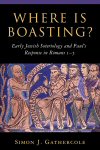
This important work challenges the validity of the “New Perspective” on Paul and Judaism. Working with new data from Jewish literature and a fresh reading of Romans 1–5, Simon Gathercole produces a far-reaching criticism of the current approach to Paul and points a new way forward. Building on a detailed examination of the past generation of scholarship on Paul and early Judaism, Gathercole’s work follows two paths. First, he shows that while early Judaism was not truly oriented around legalistic works-righteousness, it did consider obedience to the Law to be an important criterion at the final judgment. On the basis of this reconstruction of Jewish thought and a rereading of Romans 1–5, Gathercole advances his main argument–that Paul did indeed combat a Jewish perspective that saw obedience to the Law both as possible and as a criterion for vindication at the final judgment. Paul’s reply is that obedience to the Law is not a criterion for the final judgment because human nature makes obedience to the Law impossible. His doctrine of justification can therefore be properly viewed in its Jewish context, yet anthropological issues also take center stage.
Gathercole has offered a stimulating study that makes an important contribution to an ongoing debate that may perhaps, with the aid of commendable efforts like his own, enter into new and more fruitful stages of discussion.
—Journal of Biblical Literature
The volume is important for our understanding of the theology of early Judaism, for Pauline exegesis and theology and for New Testament theology in general. . . . Well written and persuasive.
—Evangelical Quarterly
Simon J. Gathercole is lecturer for the faculty of divinity at the University of Cambridge.
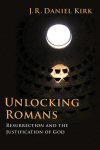
If the God of Israel has acted to save his people through Christ, but Israel is not participating in that salvation, how then can this God be considered righteous? Unlocking Romans is directed in large extent toward answering this question in order to illuminate the righteousness of God as revealed in the book of Romans.
J. R. Daniel Kirk claims the answer comes mainly in terms of resurrection. Even if only the most obvious references in Romans are considered—and Kirk certainly delves more deeply than that—the theme of resurrection appears not only in every section of the letter but also at climactic moments of Paul’s argument. The network of connections among Jesus’ resurrection, Israel’s Scriptures, and redefining the people of God serves to affirm God’s fidelity to Israel. This, in turn, demonstrates Paul’s gospel message to be a witness to the revelation of the righteousness of God.
This is a fresh, lucidly argued examination of a letter that has shaped the church in profound ways. By putting the central claim of the Christian tradition, Jesus’ resurrection, front and center for understanding how Paul argues in Romans, Kirk has done the church and the academy a great service.
—Interpretation
J. R. Daniel Kirk is assistant professor of New Testament at Fuller Theological Seminary.

Most studies of Paul concentrate solely on his theology. This book breaks new ground by focusing on the source and nature of Paul’s spirituality. Taking his cue from Paul’s express desire to “know nothing but Christ crucified,” Michael Gorman shows how Paul’s personal experience of God constantly intersects with the story of the cross, an event that both reveals the cruciform character of God and shapes believers into a community of “cruciformity” (conformity to the crucified Christ). Expertly combining biblical studies and theological reflection, this noteworthy volume presents a model of the Christian life marked by faith, love, power, and hope.
This is a good read, and not only for those interested in Pauline studies or Christian spirituality. . . . In an undemanding style without assuming detailed knowledge of Paul’s letters on the part of the reader, it makes a good general introduction to the apostle’s theology.
—Pacifica
This scholarly work would make good reading during Lent and Holy Week.
—America
Michael J. Gorman holds the Raymond E. Brown Chair in Biblical Studies and Theology at St. Mary’s Seminary and University, Baltimore, Maryland. A highly regarded New Testament scholar, he is the author of Reading Revelation Responsibly: Uncivil Worship and Witness and Elements of Biblical Exegesis: A Basic Guide for Students and Ministers.
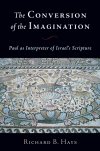
The Conversion of the Imagination contains some of the best work on Paul by first-rate New Testament scholar Richard B. Hays. These essays probe Paul’s approach to scriptural interpretation, showing how Paul’s reading of the Hebrew Scriptures reshaped the theological vision of his churches. Hays’ analysis of intertextual echoes in Paul’s letters has touched off exciting debate among Pauline scholars and made the contours of Paul’s thought more recognizable. These studies contain some of the early work leading up to Hays’ seminal Echoes of Scripture in the Letters of Paul. They also show how Hays has responded to critics and further developed his thought in the years since. Among the many subjects covered here are Paul’s christological application of Psalms, Paul’s revisionary interpretation of the Law, and the influence of the Old Testament on Paul’s ethical teachings and ecclesiology.
The Conversion of the Imagination is a must for anyone interested in the use of Scripture within Scripture. It will encourage and inform those who want to learn better how to listen to the Christian Scriptures themselves, as distinct from what others write about them.
—Anvil
Hays’ own lyrical and evocative style of writing is an ideal vehicle for exploring Paul’s own lyrical and evocative uses of Scripture. . . . Richard Hays has made a seminal contribution to biblical hermeneutics. . . . It is always fruitful to be in dialogue with him.
—Review of Biblical Literature
Richard B. Hays is dean and the George Washington Ivey Professor of New Testament at Duke Divinity School. He is internationally recognized for his work on the letters of Paul and on New Testament ethics. His book, The Moral Vision of the New Testament, was selected by Christianity Today as one of the 100 most important religious books of the twentieth century.
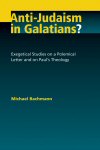
Several modern interpretations of Paul’s letter to the Galatians claim to uncover an underlying attitude of anti-Judaism. Michael Bachmann refutes those claims with his own detailed exegesis and astute examination of comparative material from the religious environment of that day, revealing instead how Paul embraces both Jews and Gentiles. Bachmann holds that, in determining meaning, the literary context of Galatians should be considered over historical background. Nonetheless, he engages parallels in Qumran material and archaeology as secondary methods to confirm his exegetical arguments. Through his rigorous examination, Bachmann shows that Galatians exhibits evidence of anti-Judaism not in itself, but only in its reception. Rich in scholarship and sound exegesis, Anti-Judaism in Galatians? is an ideal text for scholars and students seeking the whole truth about Paul.
Michael Bachmann is professor of theology at the University of Siegen, Germany.
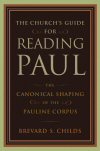
In The Church’s Guide for Reading Paul Brevard Childs turns his sharp scholarly eye to the works of the Apostle Paul and makes an unusual argument: the New Testament was canonically shaped, its formation a hermeneutical exercise in which its anonymous apostles and postapostolic editors collected, preserved, and theologically shaped the material in order for the evangelical traditions to serve successive generations of Christians.
Childs contends that within the New Testament the Pauline corpus stands as a unit bookended by Romans and the pastoral epistles. He assigns an introductory role to Romans, examining how it puts the contingencies of Paul’s earlier letters into context without sacrificing their particularity. At the other end, the pastoral epistles serve as a concluding valorization of Paul as the church’s doctrinal model. By considering Paul’s works as a whole, Childs offers a way to gain a fuller understanding of the individual letters.
Here Brevard Childs offers his clearest statement of the continuities and differences between his canonical approach and historical criticism. The book has the character of a careful, probing conversation—punctuated by disagreement—that extends also to figural readings, postmodernism, and evangelical interpretation. His final gift is to demonstrate at length how central to all the church’s work is wide-ranging, critical scriptural exegesis, guided by the Spirit and disciplined by participation in the church’s life. This book will remain part of our conversation for years to come.
—Ellen F. Davis, Amos Ragan Kearns Professor of Bible and Practical Theology, Duke Divinity School
This is vintage Childs. Who else among modern Old or New Testament scholars turns so easily to and converses so effortlessly with the other Testament and its critical scholarship? From whom else would we expect so arresting an analysis of the historical development and theological significance of ‘the canonical Paul’? It is as if Childs has hit the reset button on Pauline studies—sometimes resurrecting interpretive issues long neglected, sometimes casting contemporary discussion in fresh light, always pressing for renewed discussion of the role of the canon for reading the wider Pauline corpus in and for the church.
—Joel B. Green, professor of New Testament Interpretation, Fuller Theological Seminary
Brevard S. Childs (1923–2007) was Sterling Professor Emeritus of Divinity at Yale Divinity School. Among his many books are Biblical Theology in Crisis, Introduction to the Old Testament as Scripture, The New Testament as Canon, Old Testament Theology in a Canonical Context, and Biblical Theology of the Old and New Testaments.
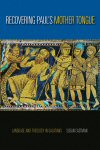
Paul’s letter to the Galatians begins with a proclamation of deliverance from the present evil age and comes to a climax with the ringing cry: “new creation!” The letter moves from the Galatian believers’ new identity in Christ to the implications of that identity for their life together. Susan Eastman here argues that Galatians 4:12–5:1 plays a key role in this movement, displaying the power of God’s act in Christ, apart from the law, not only to generate the Galatians’ new life in Christ but also to perfect it. Paul communicates to his converts the motivation and power necessary to move them from their ambivalence about his gospel to a faith that “stands fast” in its allegiance to Christ alone. Eastman argues that the medium and the message are inseparable. Paul’s discourse or “mother tongue”—packed with maternal images, vulnerable yet authoritative, and marked by personal suffering—demonstrates the content of the good news.
Susan Eastman’s thought-provoking book advances our understanding on two levels at once. Her fine-grained exegetical work deepens our comprehension of the argument of Paul’s letter to the Galatians. At the same time, her probing analysis of Paul’s maternal and family metaphors offers a subtle alternative to current polarized positions concerning authority and power relations. Eastman demonstrates the transforming and sustaining power of the new ‘cosmic relational matrix’ in which Paul and his converts share as a result of God’s grace in Christ. This is a book to be read closely and pondered by New Testament exegetes and pastoral theologians alike.
—Richard B. Hays, dean and George Washington Ivey Professor of New Testament, Duke Divinity School
The engaging youth evangelist Howard Butt often issued a warning in the latter part of his conversion-oriented preaching: ‘mountaintop experiences’ can be followed ironically by ‘saved souls and lost lives.’ Similarly acknowledging the loss of staying power that sometimes plagues our churches, Susan Eastman listens carefully to Paul’s Galatian letter, where she finds the apostle attributing such power to the gospel itself. She hears him using his mother tongue, that is, re-preaching the gospel in potent maternal metaphors that promise both the birth and the faithful endurance of the transformed family of God. Beware! Like Paul’s letters themselves, this book precludes our being mere observers.
—J. Louis Martyn, Edward Robinson Professor Emeritus of Biblical Theology, Union Theological Seminary
Susan Eastman is associate professor of the practice of Bible and Christian formation at Duke University School, where she also directs the doctor of theology program.
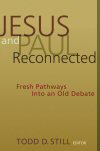
The six essays in this volume consider the relationship between Jesus and Paul from diverse angles, bringing fresh insights into an area of study that has long been dormant. Written by established scholars, Jesus and Paul Reconnected explores historical congruity between Christ and Paul and examines connections in their thought, relationships, and practices. Topics considered include the grace of God, treatment of the poor, law and gospel, Peter’s connection between the two, the Last Supper, and the death of Christ.
Todd Still brings these superb scholars together in hopes of encouraging further conversation and contributing to this growing area of New Testament research.
In this collection of fresh and insightful essays, an outstanding group of scholars offers some new and important pathways into the neglected—but historically and theologically crucial—subject of the connections between Jesus and Paul.
—David G. Horrell, professor of New Testament studies, University of Exeter
I warmly welcome this collection of essays by distinguished scholars and its serious engagement with an important and often neglected theme. The essays explore persuasively some of the agreements of Jesus and Paul (e.g., Barclay on grace and Longenecker on money and possessions); they ask important questions (e.g., Markus Bockmuehl’s masterly discussion of Peter’s role in the context of recent New Testament study); and they are at times provocative (e.g., Francis Watson’s surprising contribution on the Lord’s Supper). There is much here to stimulate thought and to encourage ongoing reflection and discussion.
—David Wenham, senior tutor in New Testament, Trinity College, Bristol
Todd D. Still is associate professor of Christian Scriptures (New Testament) at George W. Truett Theological Seminary, Baylor University, Waco, Texas.
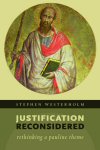
Much has been written of late about what the Apostle Paul really meant when he spoke of justification by faith, not the works of the law. This short study by Stephen Westerholm carefully examines proposals on the subject by Krister Stendahl, E. P. Sanders, Heikki Räisänen, N. T. Wright, James D. G. Dunn, and Douglas A. Campbell. In doing so, Westerholm notes weaknesses in traditional understandings that have provoked the more recent proposals, but he also points out areas in which the latter fail to do justice to the apostle.
Reading Stephen Westerholm’s sketch of justification in Paul is a duty and a joy. This volume introduces the subject clearly and elegantly to students. But it also throws down the gauntlet to the New Perspectivists. How will they respond?
—Simon Gathercole, director of studies, Fitzwilliam College, University of Cambridge
Every student wrestling with ‘justification’ will be grateful for this highly engaging book. Westerholm nimbly develops the mainstream interpretation, while critiquing popular current alternatives (including those by Campbell and Wright). Here is ready ammunition for an important continuing debate.
—John M. G. Barclay, Lightfoot Professor of Divinity, Durham University
Stephen Westerholm is professor of biblical studies at McMaster University, Hamilton, Ontario. He is the author of Preface to the Study of Paul and Israel’s Law and the Church’s Faith: Paul and His Recent Interpreters.
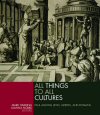
All Things to All Cultures: Paul among Jews, Greeks, and Romans
- Editors: Mark Harding and Alanna Nobbs
- Publisher: Eerdmans
- Publication Date: 2013
- Pages: 426
All Things to All Cultures sets Paul in his first-century context and illuminates his interactions with Jews, Greeks, and Romans as he spread the gospel in the Mediterranean world. In addition to exploring Paul’s context and analyzing his letters, the book has chapters on the chronology of Paul’s life, the text of the Pauline letters, the scholarly contributions to our understanding of Paul over the last 150 years, and the theology of the Pauline corpus.
This multi-author volume comprises a valuable collection of studies that draw upon and communicate state-of-play scholarship on an impressive galaxy of Pauline topics, judicious assessments of competing hypotheses, and discussion of a wide panoply of evidence that make it a necessary acquisition for libraries and necessary reading for anyone doing serious work on the Apostle Paul. Highly recommended!
—Larry W. Hurtado, emeritus professor of New Testament language, literature, and theology, University of Edinburgh
Mark Harding is dean of the Australian College of Theology and an honorary associate of Macquarie University.
Alanna Nobbs is professor of ancient history and deputy director of the Ancient Cultures Research Centre at Macquarie University and coeditor of The Content and Setting of the Gospel Tradition.
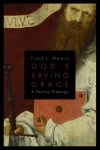
Distinguished biblical scholar Frank Matera here views the theology of the Pauline letters through the lens of the saving grace that Paul experienced at his call and conversion. Focusing on christology, soteriology, theology, anthropology, ecclesiology, ethics, and eschatology, Matera explores both the unity and the diversity of the 13 Pauline letters.
Throughout my years of teaching, I have learned to look to Frank Matera as a sure guide to the thought of Paul. His commentaries on Paul’s various epistles are sterling examples of profound thought expressed with clarity and simplicity. This new distillation of Matera’s thought on Paul is to be welcomed by all teachers of the New Testament.
—John P. Meier, William K. Warren Professor of Theology, University of Notre Dame
Clarity of thought and expression distinguishes this fresh (and refreshing) contribution to the study of Pauline theology. Matera sets for himself the bold task of explaining how the thirteen different Pauline letters are related to and cohere with one another theologically. . . . This volume is a must for all who are interested in Pauline theology.
—Marion L. Soards, professor of New Testament studies, Louisville Presbyterian Theological Seminary
Frank J. Matera is Andrews-Kelly-Ryan Professor of Biblical Studies at Catholic University of America. He is the author of New Testament Ethics: The Legacies of Jesus and Paul and commentaries on Galatians, 2 Corinthians, and Romans.